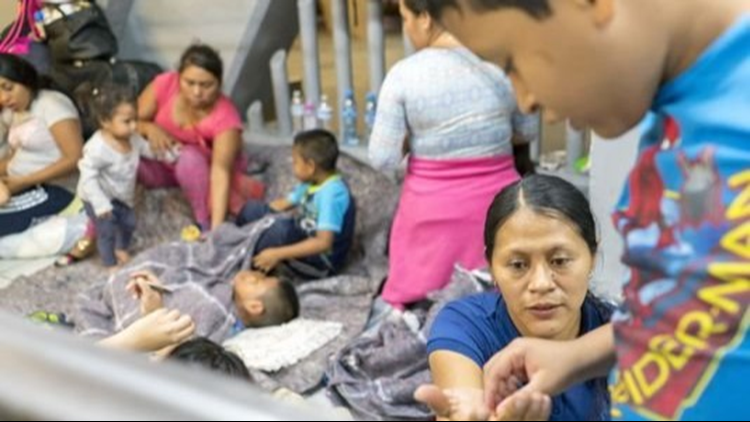Separated from her parents at the southern border, a 9-year-old girl from Guatemala who recently arrived in Michigan often cries out in Spanish: "Where's my mom? When can I talk to my mom? When can I see my mom?"
Her cries of pain are echoed across the United States with a growing number of immigrant children being ripped by U.S. officials from their parents after they cross the border illegally in hopes of getting asylum.
Last month, the administration of President Donald Trump started strictly enforcing the removal of the children of those parents and placing them in separate facilities. In some cases, they are being sent to Michigan to be handled by foster care groups like Bethany Christian Services, based in Grand Rapids.
"These kids have been through really hell on Earth, and now they're separated from their parents," said Chris Palusky, CEO and President of Bethany Christian Services, which has offices across Michigan and works in 36 states.
"They're confused, they're scared, and they want to be with their family. They're acting out; they've been through some of the worst trauma and they're continuing to go through more trauma because they're separated from their family unit."
In Michigan, foster care and immigrant groups say they are seeing an increased number of children arriving in the state who have been separated by U.S. officials from their parents. The total number of separated children who have been sent to Michigan is unclear.
"We've seen an increase, especially in the past couple of weeks," Palusky, who oversees 1,500 employees, told the Free Press. "The administration has stated that they are enforcing the law that people who cross the border are to be prosecuted, so when they cross the border, there's 100% separation of children from their parents. Before, that wasn't necessarily the case. Now, it is a law that is enforced and we're seeing any time there's a kid coming across with his mom or something, they're immediately separated."
Since May 1, Bethany Christian Services has served 76 children in their transitional foster care programs in Michigan, 58 of which were children separated from their families, according to statistics provided through a spokeswoman by Dana Anderson, associate director of Bethany’s Grand Rapids Branch.
Out of the 58 children separated, almost half, 27, were admitted in May, the month that the U.S. started separating children. In January, Bethany admitted only one child who was separated, 10 in February, 11 in March, 7 in April.
The children are being sent to Michigan because that is where Bethany Christian Services has its transitional foster care programs, Anderson said. Bethany contracts with the U.S. Dept. of Health and Human Services for foster care of the kids.
The Michigan Immigrant Rights Center is also seeing a greater percentage of kids they're screening who have been separated from their parents.
Last month, two-thirds of the kids they screened were separated from their parents, said Susan Reed, Managing Attorney with the Michigan Immigrant Rights Center.
In May, the immigrant center screened 33 children, 22 of whom had been separated from parents and eleven of whom had arrived unaccompanied. The two-thirds percentage was higher than in previous months.
"It doesn't matter if that's a newborn child or if that's a young teenager," said Palusky of the child separations. "You're seeing kids of all ages being separated from their parents, so we are definitely seeing an uptick."
"We are ramping up and preparing to ramp up even more, because we are eager to meet the need of vulnerable children."
The separations have brought criticism from many civil rights groups and Democratic Party leaders. Attorney General Jeff Sessions strongly defended the separations in a radio interview this week with host Hugh Hewitt.
Sessions said more people are entering illegally with their children, which he hopes to reduce.
"The law requires us to keep children in a different facility than we do for adults," Sessions said, according to a transcript by Real Clear Politics. "And every time somebody ... gets prosecuted in America for a crime, American citizens, and they go to jail, they’re separated from their children."
"We don’t want to do this at all," Sessions added. "If people don’t want to be separated from their children, they should not bring them with them. We’ve got to get this message out. You’re not given immunity. You have to, you will be prosecuted if you … come illegally. And if you bring children, you’ll still be prosecuted."
Sessions said "those children are being well taken care of. Within 72 hours, they’re taken to the Health and Human Services to be sure they’re properly cared for. And those persons will have, the adults will be prosecuted like the law requires."
Hewitt asked how Sessions, as a grandfather, would feel if his grandchildren were separated from their parents.
Sessions replied that "the United States can’t be a total guarantor that every parent who comes to the country unlawfully with a child is guaranteed that ... they will be able to have their hand on that child the entire time. That’s just not the way it works."
While Bethany Christian Services is helping out the children, Palusky says he would prefer the kids not to be separated.
"We feel it's better for them to stay with the family rather than a detention center or a military base," Palusky said. "We definitely believe that they should first and foremost be able to stay with their families."
Palusky said he would ask the public to be understanding of the families who are crossing the border because many are fleeing violent situations.
"We really also want to look at the root cause, like why are they running?" he said. "I was in Honduras maybe a year and a half ago, and I talked to people and you heard of people leaving, wanting to come to the U.S. Well, they were fleeing because of the gang violence down there, the bad governance, the lack of opportunity. I remember one story of somebody telling me that they had to pay money to the gangs, protection money. If they didn't pay that money, then their daughter was gonna be taken and she was gonna be sold basically into prostitution."
"People are faced with these really hard decisions of, 'What do I do? My family's at jeopardy, my children could be taken or even killed.' So it's not like people are just light-heartedly saying, 'Let's go to the U.S.' They're fleeing because of lack of security and they're scared."
Palusky said his wife hears the girl from Guatemala constantly asking for her mother. But, for now, she and many others are being forced to live without their parents.
The future of the girl and others like her is uncertain. For now, they may get temporary foster care.
"We then hope to reunite them with their families as soon as possible," Paulsky said. "We would hope that the (legal) process wouldn't take too long and they wouldn't have to stay with those (foster) families too long, but we've had some really great people to step up and just be willing to foster those kids during this challenging period."
The children could be separated for three to four months, or longer, he said.
"It depends on the status that they get," Palusky said. "Do they get a refugee status? Are they deported? ... They go through the legal system, so it basically goes before the courts."
Contact Niraj Warikoo: nwarikoo@freepress.com or 313-223-4792. Follow him on Twitter @nwarikoo
►Make it easy to keep up to date with more stories like this. Download the WZZM 13 app now.
Have a news tip? Email news@wzzm13.com, visit our Facebook page or Twitter.



